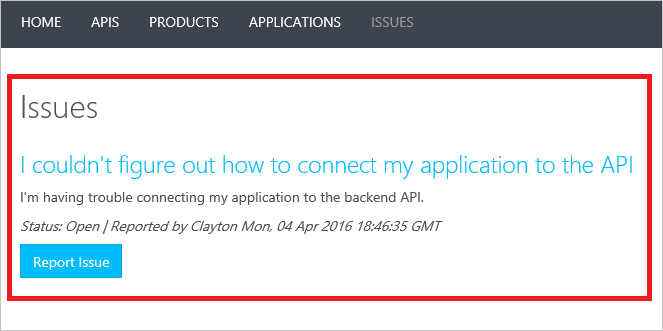Issue templates in Azure API Management
Azure API Management provides you the ability to customize the content of developer portal pages using a set of templates that configure their content. Using DotLiquid syntax and the editor of your choice, such as DotLiquid for Designers, and a provided set of localized String resources, Glyph resources, and Page controls, you have great flexibility to configure the content of the pages as you see fit using these templates.
The templates in this section allow you to customize the content of the Issue pages in the developer portal.
Note
Sample default templates are included in the following documentation, but are subject to change due to continuous improvements. You can view the live default templates in the developer portal by navigating to the desired individual templates. For more information about working with templates, see How to customize the API Management developer portal using templates.
Note
The following documentation content is about the deprecated developer portal. You can continue to use it, as per usual, until its retirement in October 2023, when it will be removed from all API Management services. The deprecated portal will only receive critical security updates. Refer to the following articles for more details:
Availability
Important
This feature is available in the Premium, Standard, Basic, and Developer tiers of API Management.
For feature availability in the v2 tiers (preview), see the v2 tiers overview.
Issue list
The Issue list template allows you to customize the body of the issue list page in the developer portal.

Default template
<div class="row">
<div class="col-md-9">
<h2>{% localized "IssuesStrings|WebIssuesIndexTitle" %}</h2>
</div>
</div>
<div class="row">
<div class="col-md-12">
{% if issues.size > 0 %}
<ul class="list-unstyled">
{% capture reportedBy %}{% localized "IssuesStrings|WebIssuesStatusReportedBy" %}{% endcapture %}
{% assign replaceString0 = '{0}' %}
{% assign replaceString1 = '{1}' %}
{% for issue in issues %}
<li>
<h3>
<a href="/issues/{{issue.id}}">{{issue.title}}</a>
</h3>
<p>{{issue.description}}</p>
<em>
{% capture state %}{{issue.issueState}}{% endcapture %}
{% capture devName %}{{issue.subscriptionDeveloperName}}{% endcapture %}
{% capture str1 %}{{ reportedBy | replace : replaceString0, state }}{% endcapture %}
{{ str1 | replace : replaceString1, devName }}
<span class="UtcDateElement">{{ issue.reportedOn | date: "r" }}</span>
</em>
</li>
{% endfor %}
</ul>
<paging-control></paging-control>
{% else %}
{% localized "CommonResources|NoItemsToDisplay" %}
{% endif %}
{% if canReportIssue %}
<a class="btn btn-primary" id="createIssue" href="/Issues/Create">{% localized "IssuesStrings|WebIssuesReportIssueButton" %}</a>
{% elsif isAuthenticated %}
<hr />
<p>{% localized "IssuesStrings|WebIssuesNoActiveSubscriptions" %}</p>
{% else %}
<hr />
<p>
{% capture signIntext %}{% localized "IssuesStrings|WebIssuesNotSignin" %}{% endcapture %}
{% capture link %}<a href="/signin">{% localized "IssuesStrings|WebIssuesSignIn" %}</a>{% endcapture %}
{{ signIntext | replace : replaceString0, link }}
</p>
{% endif %}
</div>
</div>
Controls
The Issue list template may use the following page controls.
Data model
| Property | Type | Description |
|---|---|---|
Issues |
Collection of Issue entities. | The issues visible to the current user. |
Paging |
Paging entity. | The paging information for the applications collection. |
IsAuthenticated |
boolean | Whether the current user is signed-in to the developer portal. |
CanReportIssues |
boolean | Whether the current user has permissions to file an issue. |
Search |
string | This property is deprecated and should not be used. |
Sample template data
{
"Issues": [
{
"Id": "5702b68bb16653124c8f9ba7",
"ApiId": "570275f1b16653124c8f9ba3",
"Title": "I couldn't figure out how to connect my application to the API",
"Description": "I'm having trouble connecting my application to the backend API.",
"SubscriptionDeveloperName": "Clayton",
"IssueState": "Proposed",
"ReportedOn": "2016-04-04T18:46:35.64",
"Comments": null,
"Attachments": null,
"Services": null
}
],
"Paging": {
"Page": 1,
"PageSize": 10,
"TotalItemCount": 1,
"ShowAll": false,
"PageCount": 1
},
"IsAuthenticated": true,
"CanReportIssue": true,
"Search": null
}
Next steps
For more information about working with templates, see How to customize the API Management developer portal using templates.